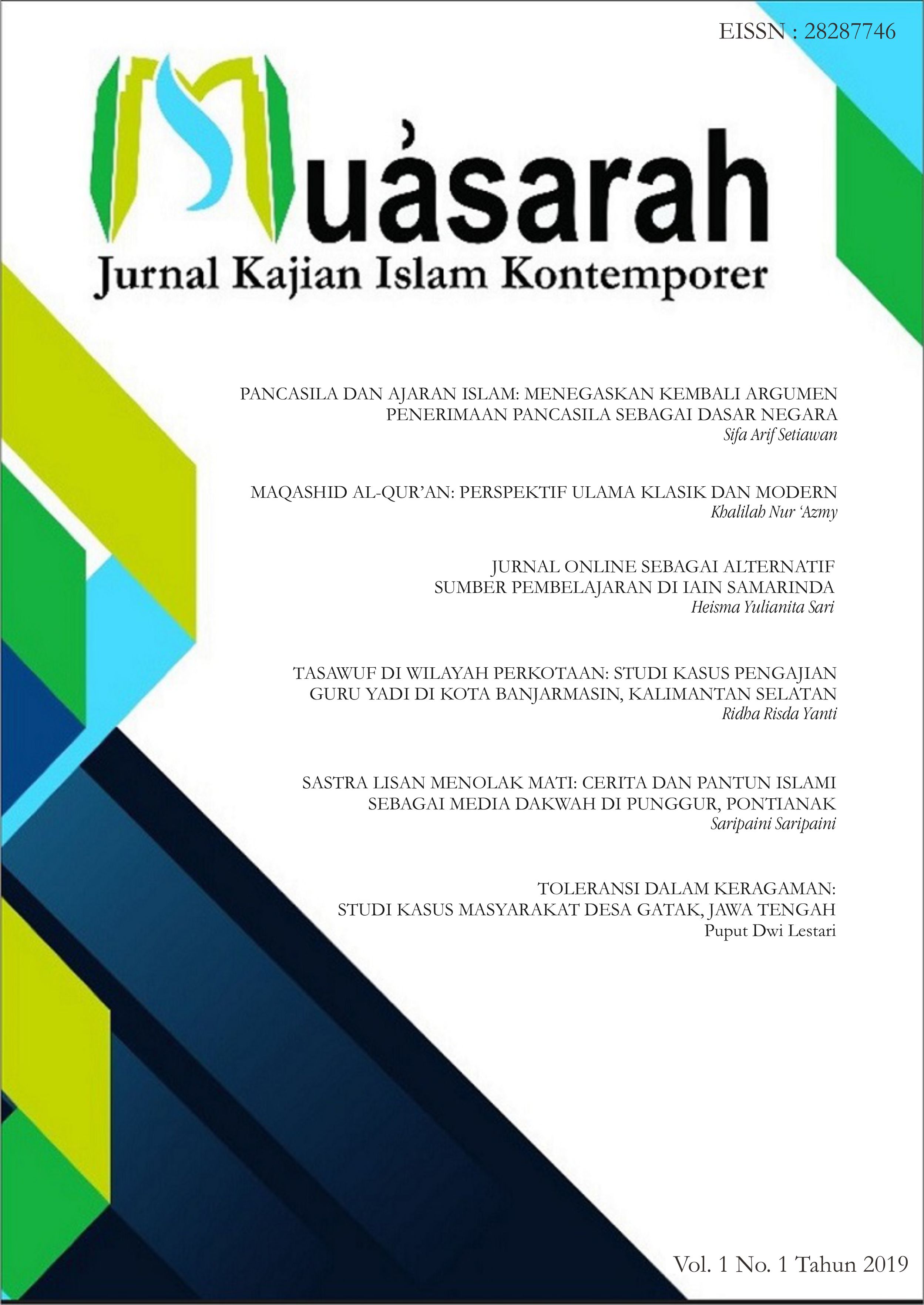MAQASHID AL-QUR’AN: PERSPEKTIF ULAMA KLASIK DAN MODERN
DOI:
https://doi.org/10.18592/msr.v1i1.3267Keywords:
Maqashid Al-Qur’an, classical and modern exegetes, Qur’anic interpretation, mufassir klasik dan modern, tafsiran al-Qur’an,Abstract
Abstract: This article compares Maqashid Al-Qur’an or main themes of al-Qur’an as identified by classical and modern time exegetes. The analysis on four classical Qur’anic scholars and four modern-time exegetes indicates that the main themes of al-Qur’an evolve from time to time. It shows that classical Qur’anic scholars tended to view that al-Qur’an focuses on theological issues surrounding tauhid, prophethood and the Hereafter, while modern-time scholars thought that al-Qur'an also paid serious attentions to contemporary concerns. This article also discusses Maqashid Al-Qur’an as a critique to exegeses that filled the space with unimportant matters, such as detailed historical events mentioned in al-Qur’an as opposed to focusing on explaining the objective of a verse or sȗrah. Finally, it suggests that the awareness of Maqashid Al-Qur’an opens the space for new mufassir to find the relevance of al-Qur’an for their age. Abstrak: Artikel ini membandingkan Maqashid al-Qur’an atau tema-tema pokok al-Qur’an hasil pemikiran mufassir klasik dan modern. Analisis terhadap empat ulama klasik dan empat penafsir zaman modern menunjukkan adanya perkembangan tema-tema pokok al-Qur’an dari waktu ke waktu. Para ahli tafsir klasik cenderung melihat bahwa al-Qur’an berkonsentrasi pada isu-isu teologis meliputi ketuhanan, kenabian, dan akhirat, sementara para ahli tafsir modern menganggap bahwa al-Qur’an juga memberikan perhatian serius pada masalah-masalah kontemporer. Artikel ini juga mendiskusikan Maqashid al-Qur’an sebagai sebuah kritik terhadap para ahli tafsir yang membahas hal-hal yang kurang penting, seperti rincian peristiwa sejarah yang disebutkan di dalam al-Qur’an ketimbang menjelaskan tujuan dari sebuah ayat atau surah. Akhirnya, artikel ini menyarankan bahwa kesadaran akan Maqashid al-Qur’an akan membuka ruang bagi para mufassir baru untuk menemukan kesesuaian antara al-Qur’an dan tantangan zaman mereka.References
Alwani, Zainab. (2014). Maqâshid Qur’aniyyah: A Methodology on Evaluating Modern Challenges and Fiqh al-Aqalliyyat. The Muslim World. Vol. 104.
Al-Alwani, Thaha Jabir. (2005) Issues in Contemporary Islamic Thouht. London: The International Institute for Islamic Thought.
(2003) At-Tauhid, At-Tazkiyyah, Al-‘Umran. Beirut: Darul Hadi.
Al-Ghazali, Abu Hamid. (1984). Jawahir al-Qur’an. Beirut: Dar Ihya al Ulum.
Al-Ghazali, Muhammad. (1995). Nahwa Tafsir Mawdhu’i-Suwar al-Qur’an al-Karim. Kairo: Dar al Syuruq.
Al-Khatib, Ibnu. (2017). Maqashid al-Qur’an wa Ahammiyatuha fi Tahdid al-Mawdhu’ al-Qur’an, Dirasah Nashiyah fi Ba’dhi Kutub at-Tafsir wa Ulum al-Qur’an al-Karim.
As-Suyuthi, Jalaluddin. (2013). Al itqan fi ulum al quran (Vol. 5). Isha Books.
At-Thabari, A. T. (1997). Tafsir At-Thabari. Pustaka Azzam.
At-Tijani, Ali Al-Basyar Al-Faki. (2013). Maqashid Al-Qur'an Al-Karim wa Washilatuha bi at-Tadabbur. Al-Muktamar al-'Alimi li at-Tadabbur al-Qur'an, 1.
Islam, Tazul. (2013) The genisis and development of Maqasid al-Quran. American Journal of Islamic Social Science, 30.
Jamaruddin, Ade. (2015). Social Approach In Tafsir Al-Qur’an Perspective Of Hasan Hanafi. Jurnal Ushuluddin. Vol. 23.
Raisuni, Ahmad. (2013). Maqashidul Maqashid, al-Ghayat al-Ilmiyyah wa al. -‘Amaliyyah Limaqashid asy-Syari’ah. Dar Arabia lin-Nasr wa Abhats.
Ridha, Muhammad Rasyid. (2005). Tafsir al Manar. Kairo: Mathba’ah al-Manar.
Saeed, Abdullah. (2017). Paradigma, Prinsip dan Metode Penafsiran Kontekstualis atas Al-Qur’an. Yogyakarta: Baitul Hikmah Press2.
Thahir, T. (1984). Tafsir at-Tahrir wa at-Tanwir (Vol. 1). Tunisia: ad-Dar at-Tunisiyyah li an-Nasyr.
Warson, A. (1997). Kamus al-Munawwir Arab-Indonesia Terlengkap. In Kamus al-Munawwir (p. 1591). Pustaka Progresif.
Downloads
Published
How to Cite
Issue
Section
License
Authors who publish with this journal agree to the following terms:
- Authors retain copyright and grant the journal right of first publication with the work simultaneously licensed under a Creative Commons Attribution License that allows others to share the work with an acknowledgement of the work's authorship and initial publication in this journal.
- Authors are able to enter into separate, additional contractual arrangements for the non-exclusive distribution of the journal's published version of the work (e.g., post it to an institutional repository or publish it in a book), with an acknowledgement of its initial publication in this journal.
- Authors are permitted and encouraged to post their work online (e.g., in institutional repositories or on their website) prior to and during the submission process, as it can lead to productive exchanges, as well as earlier and greater citation of published work.






